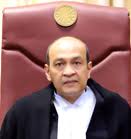Interim Relief/Delhi High Court/leave being granted to the proposed co-plaintiffs to institute the accompanying suit under Section 92 of the Code of Civil Procedure, 1908

leave being granted to the proposed co-plaintiffs to institute the accompanying suit under Section 92 of the Code of Civil Procedure, 1908.
suit proposed to be instituted under Section 92 of the Code relates to the affairs of a public charitable trust named Raghuvanshi Charitable Trust.2 The application for leave was originally preferred by Shri Ram Sarup Lugani and Shri Bahushrut Lugani. On 04 April 2019, this Court while noticing the issues which arise in some detail, proceeded to pass an order restraining the defendants from withdrawing any money directly or indirectly for themselves from the funds of the defendant No.7 or the schools falling under the management and control of the Trust.
In (1994) 1 ArbLR 385 Kelson Construction v. Versha Spinning Mills Ltd. & Anr., the court held thus:—
“6. In Loonkaran Sethia etc. v. Mr. Ivan E. John and others etc., AIR 1977 SC 336 the Hon’ble Supreme Court has held that the provisions of Section 69 are mandatory in character and its effect is to tender suit by a plaintiff in respect of a right vested in him or acquired by him under a contract which he entered into as a partner of an unregistered firm, whether existing or dissolved, void. What is material is that on the date of institution of the suit the partnership should have been registered failing that the suit would fail. In Shankar Housing Corporation v. Smt. Mohan Devi and Others, AIR 1978 Delhi 255, a Division Bench of this Court had also taken the following view:
“The point of time contemplated in Section 69(2) is at the time of the institution of the suit. That is to today, the firm must be a registered firm by the date of the institution of the suit and the person suing (i.e., all the partners) must have been shown in the Register of Firms as partners of the firm by the date of the institution of the suit.
Sub-section (1) and (2) of Section 69 are substantives provisions intended to discourage the non-registration of firms. The provision in Section 69(2) is mandatory and makes the registration of a firm a condition p;precedent to the institution of a suit of the nature mentioned in it.”
Similarly another single Bench of this Court in the case of
Kavita Trehan and others v. Balsara Hygienic Products Ltd., AIR 1992 Delhi 92, had held that a suit filed by a partner of a firm which is not registered on the date of the filing of the suit would be hit by the provisions of Section 69(2) of the Indian Partnership Act and as such it is not maintainable and is liable to be dismissed. In the case of M/s. Shreeram Finance Corporation v. Yasin Khan and others, AIR 1989 SC 1769, the Hon’ble Supreme Court had gone to the extent of laying down that even if the suit is instituted by a registered firm, but change in the constitution12. A consideration of the principles which came to be enunciated and recognized in Rahul Jain would establish that the Court fundamentally held that on the date when an application seeking leave to sue is taken up for consideration, the record must reflect that it is supported by not less than two individuals in light of the mandatory provisions of Section 92. This is evident from the plain language employed in that provision which uses the expression “two or more persons having an interest…”.
13. Undoubtedly, a Section 92 suit cannot be recognized as having come to be instituted unless the application for grant of leave of the Court is granted. Till that time, the suit would remain a proposed action with respect to the affairs of a public charitable trust. Evidently, in Rahul Jain on the date when leave was granted by the Court, there was only one individual who remained on the record of the application seeking leave. It is in that backdrop that the Court came to conclude
that the order granting leave was unsustainable.
The Court further finds that the exercise of power under Section 151 of the Code clearly appears to be permissible in law in absence of an express provision in the Code prohibiting the adoption of the measure propounded by the Court in exercise of it inherent powers. More fundamentally, the facts of the present case clearly justify the invocation of inherent powers in order to ensure that the ends of justice are subserved and the asserted silence of the Code does not result in prejudice being caused. The situation which arises clearly warrants the invocation of the inherent powers of the Court in order toensure that the interest of the lis is not rendered a casualty on the altar of a technical and pedantic interpretation of a procedural statute.
Click here for read the judgment
Ram Swaroop Lugani vs lugani & ors:Judgment:Delhi High Court : intern Direction
